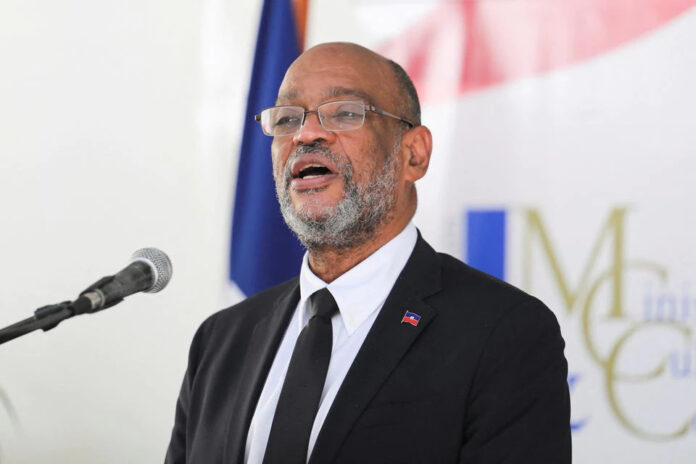Mon., Feb. 14, 2022, Valentine’s Day, was, in Haiti, the day of the bitter break between the signatories of the Aug. 30 and Sep. 11 Accords. This was just the byproduct of a deeper rift, which exposes the cynicism and folly of the two politically similar camps with rival plans for how to carry out the transition back to constitutional government, one as “quickly as possible” and the other over the course of about two years.
So, one might ask, what’s the problem? A week earlier, it was already suspected that the members of the Prime Minister’s Sep. 11 Agreement and their Aug. 30 counterparts had established their first direct contacts. It was Feb. 2, 2022, and the signatories of the Montana Agreement had just designated their representatives for the “Transition of Rupture” – a President and a Prime Minister – addressing themselves by mail to the interim Prime Minister to propose they begin a dialogue on the transition. Without delay, but without really believing it, Henry accepted the idea of a summit.
A few days later, on Fri. Feb. 11, the two groups met at the Prime Minister’s residence in Musseau. After a stormy and tedious debate, if are to believe the very words of the two protagonists, things did not go very well. Ariel Henry himself, during a press conference after the meeting, spoke of a “meeting which was quite long,” and a few hours later, on his Twitter account, wrote that it was “a meeting which was laborious.” In fact, it was his counterparts’ statements that really interested the general public. It turns out that those who had requested this first meeting did not do as is customary after such a meeting: hold a press conference.
Ariel Henry tweeted that it was “a meeting which was laborious.”
It was already a sign that things had gotten off to a bad start between the two groups. The quartet representing the Aug. 30 Montana Agreement – Leslie Voltaire (representing the Lavalas Family party), Ernst Mathurin, Magali Comeau Denis, and Jacques Ted Saint-Dic from the Agreement Monitoring Office (BSA) – gave no explanation for the postponement of their press conference. That evening, the BSA put out a note saying that “for reasons beyond our control, the press conference which was scheduled for today after the meeting with the de facto Prime Minister is postponed until tomorrow Sat., Feb. 12 at 10:00 a.m. at the same address, 9 Rue Rivière, RNDDH”. We understood immediately that the meeting with Ariel Henry had gone badly. Especially since, in the meantime, there were a number of revelations in the American press – the New York Times and CNN – relating to President Jovenel Moïse’s assassination. These revelations highlighted the Prime Minister’s possible involvement in this murder through his friend Joseph Felix Badio, still on the run and presented as one of the alleged masterminds of this heinous act.
On Sat., Feb. 12, the media were on a war footing at the RNDDH’s premises to hear the version of Ariel Henry’s rivals. All the BSA delegates were present except for Leslie Voltaire. Magali Comeau Denis, Jacques Ted Saint-Dic, and Ernst Mathurin each delivered their thoughts and feelings about the meeting and adjusted their group’s approach vis-à-vis the tenant of the Villa d’Accueil, while putting the bar very high for the resumption of negotiations on Mon., Feb. 14.
“Yesterday, there was time to make clear our different positions. Some things that were said have been clarified,” the Montana Group said. “Then we agreed on the principle of negotiations. For us, this is an extremely important moment. Now, we will have to define the criteria and the content of the negotiations, the agenda, the time that will be devoted, and the conditions. If we reach an agreement on the protocol, negotiations will begin. At the level of the Montana Accord, we are ready to negotiate. Our Agreement was obtained on the basis of negotiations. There are suspicions about Ariel Henry’s alleged involvement in the death of Jovenel Moïse that need to be clarified. In addition, we must address the demands of the [demonstrating] workers and their repression by PNH [Haitian National Police] agents during their demonstration,” which had occurred earlier that week.

After a long precision and taking care to set almost impossible conditions for Ariel Henry, the signatories of the Montana Accord, almost everyone understood, were looking for a way out of this trap into which they had placed themselves. Indeed, unable to decline without a valid reason the Feb. 14 appointment fixed during the first meeting, the Montana delegates were walking backwards down the road to Musseau, to the Prime Minister, for this meeting which they did not want.
The meeting was scheduled for 4:00 p.m., but apparently nobody in the Prime Minister’s office nagged Ariel Henry to be there on time. Thus, at 4:22 p.m., not seeing the host of the place, the Montana emissaries dropped the matter and returned to their base.
Then there began a succession of Tweets, a war of Tweets, began between the two camps, each casting blame on the other, which says a lot about the will of Haitian political actors to stop playing with the people’s destiny at the end of a political transition and socio-political crisis which has reduced the state to a beggar.
It was the Montana Accord’s BSA members who opened hostilities with a first Tweet at 5:25 p.m. sharp, questioning the non-compliance of the Prime Minister and other Sep. 11 Accord members with the scheduled meeting time. They tweeted: “On Feb. 11, we waited 40 minutes for Dr. Henry and his allies in a room without a word of apology. Despite everything, we discussed and we agreed on the agenda of the discussions. Today we waited 25 minutes. Nobody came to talk to us. This shows that they do not attach any importance to the dialogue expected by the whole country. We left.” In reality, the signatories to the Aug. 30 Accord were waiting for an opportunity to storm away from the table before the talks even really began.
Clearly, the signatories of the Aug. 30 Agreement want to suspend all relations with the Prime Minister unless he accepts the BSA’s demands unconditionally
Claiming a delay of a few minutes for the start of a political meeting, especially in Haiti, is really taking all Haitians for children. Of course, the Prime Minister was wrong not to be on time given the challenges of the moment. Above all, he had already received his guests in the salons of the Primature the first time. It is even a matter of respect for those you are talking to.
That said, the Montana signatories should have stayed a few more minutes if they were serious about putting in place, as they say, the modalities, the methodology, the protocol, and the timeframe for the negotiations. According to the Prime Minister’s supporters, among them, Edmonde Supplice Beauzile, who is playing the role of the regiment’s front line soldier, this “time” question is only an alibi given by Montana group to slam the door on talks.
She also tweeted to give the version of the Prime Minister and his friends of the Sep. 11 Agreement on what really happened. “I had come to participate in the meeting between signatories of the Sep. 11 Agreement and those who express their position through the Montana document,” the Prime Minister retorted. “We were present, waiting for them to be there in full. At 4:15 a.m., there were only two of them. They left at 4:22 a.m. There it is! We are not going to wage a war on the question of time. 80% of the signatories of the Sep. 11 agreement were present before 4 p.m. We were waiting for the signatories from Montana. At 4:10 a.m., I saw Magali Comeau Denis and Ted Saint-Dic in the room. I greeted them. At 4:15 p.m., someone from the Primature informed us of the presence of a third member of the Montana accord. They were awaiting the arrival of a fourth member. We were waiting for that member too. Then someone came to tell us they were gone. So far, it seems like a misunderstanding. That’s why we’re still here, waiting for them.”
Again, this question of tardiness motivating the opposing team to give up on Ariel Henry does not hold water and does not convince anyone knowing Haiti’s political atmosphere. Moreover, without delay, on the very evening of Feb. 14, the BSA had sent a new letter to Henry imposing on him a range of conditions to be fulfilled before any resumption of talks on the transition. They demanded, among other conditions, a neutral place, no more question of coming to sit neither at the Primature nor at the Villa d’Accueil, the strongholds of Ariel Henry. They demanded “that the seat of the meetings be moved to a neutral place, a hotel whose costs will be borne equally by both parties.”
The Montana Accord even demanded “that the de facto head of the government publicly stop… the illegal appointment of Supreme Court judges, the establishment of his Provisional Electoral Council, of its Constituent Assembly and its Supervisory Authority, and so many other decisions that can only be legitimized by a broad consensus.” Clearly, the signatories of the Aug. 30 Agreement want to suspend all relations with the Prime Minister unless he obeys or accepts the BSA’s demands unconditionally, which would already be a first victory for Montana and would also signal the first failure of the chieftains of the political parties who advise and surround Ariel Henry since his seizure of power.
So on one side, with arms crossed, is the Montana Accord group (which is formally allied with the Protocol for National Understanding – PEN – headed effectively by former Sen. Youri Latortue and current Senate president Joseph Lambert). And on the other side is the Sep. 11 Accord group of Musseau. This Montana group’s last letter might seal the break between the two agreements, because, until today, acting Prime Minister Ariel Henry and his allies have not responded to the BSA members’ demands.












[…] escalating the crisis of insecurity and poverty inside Haiti by way of PM Henry’s corruption and delay tactics. Henry, who has no popular mandate, requested this intervention on October 9, 2022. This request […]